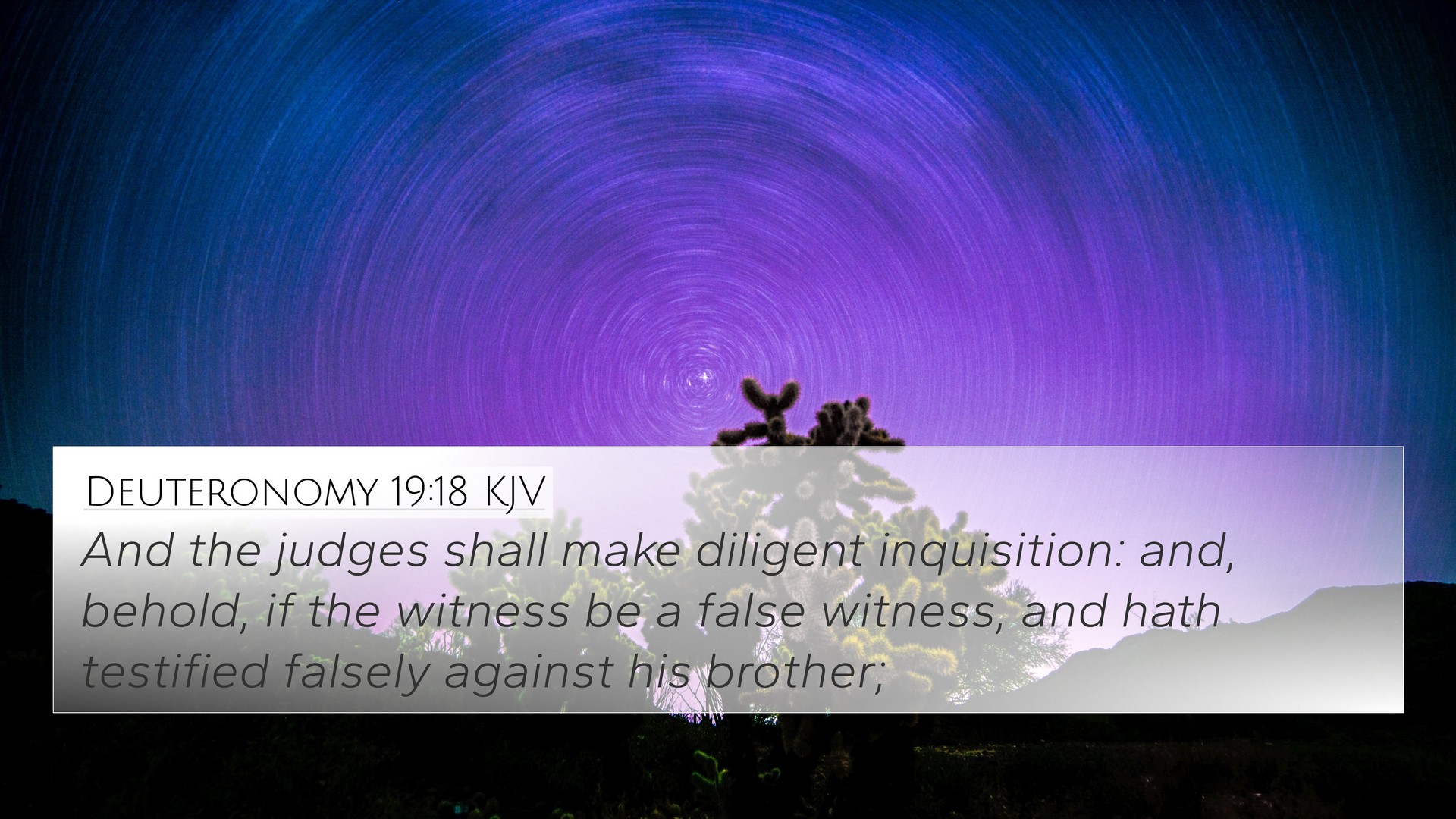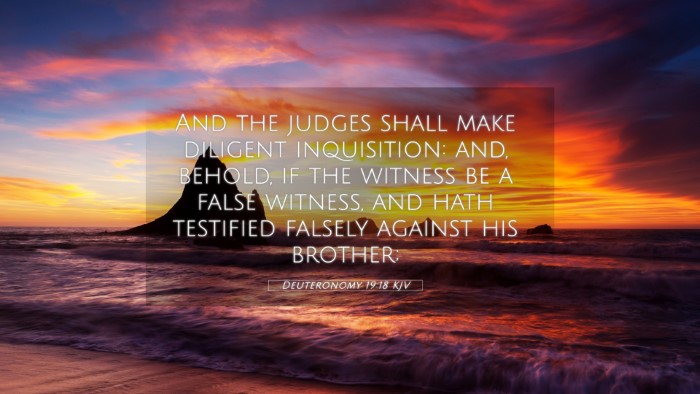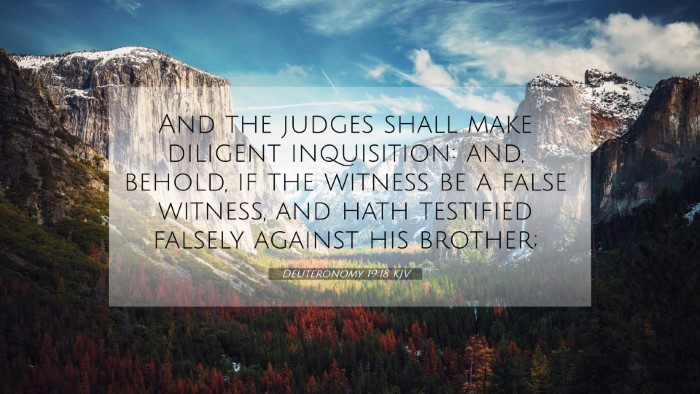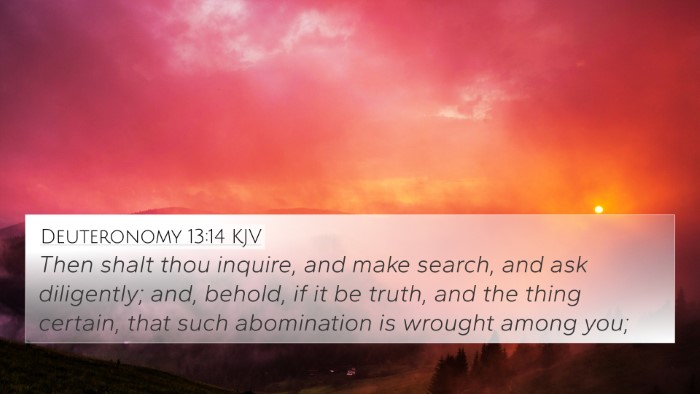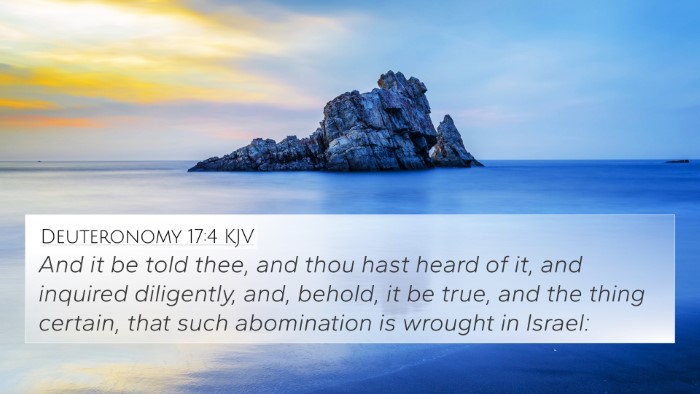Understanding Deuteronomy 19:18
Deuteronomy 19:18 states: "And the judges shall make diligent inquisition: and, behold, if the witness be a false witness, and hath testified falsely against his brother."
This verse highlights the importance of justice and integrity within the judicial system of Israel.
Meaning and Interpretation
In this verse, we see a clear directive to judges regarding their role in ensuring justice. Matthew Henry emphasizes that judges must "make diligent inquisition," indicating a thorough investigation into the accusations presented. This diligence serves to protect the innocent and uphold the truth.
Albert Barnes, on the other hand, points out that the consequences of false witnessing could lead to severe penalties for the accuser, underscoring the moral weight of testimony in judicial proceedings. Adam Clarke expands on this by explaining that such standards of honesty promote a fair judicial process. The integrity of evidence is vital, and false accusations undermine societal order.
Importance of Justice
This verse illustrates a broader theme of justice that permeates the Scriptures. It calls for accountability among witnesses and ensures that truth prevails in court. The demand for a diligent investigation reinforces the doctrine that justice must not only be done but also be seen to be done.
Related Scripture References
- Exodus 20:16: "Thou shalt not bear false witness against thy neighbor." - This commandment emphasizes the moral obligation to tell the truth.
- Proverbs 19:5: "A false witness shall not be unpunished, and he that speaketh lies shall not escape." - Echoes the consequences of false testimony.
- 1 Timothy 5:19: "Against an elder receive not an accusation, but before two or three witnesses." - Highlights the necessity of multiple witnesses for veracity.
- Matthew 7:1: "Judge not, that ye be not judged." - Reminds us of the humility required in judgments.
- Deuteronomy 17:6: "At the mouth of two witnesses, or three witnesses, shall he that is worthy of death be put to death; but at the mouth of one witness he shall not be put to death." - Stresses the importance of sufficient evidence.
- John 8:17: "It is also written in your law, that the testimony of two men is true." - Refers to the requirement of multiple witnesses in establishing truth.
- Hebrews 10:28: "He that despised Moses' law died without mercy under two or three witnesses." - Points to the seriousness of testimony as seen in the law.
Cross-Referencing Biblical Texts
Understanding Deuteronomy 19:18 provides a gateway to explore inter-Biblical connections, revealing how themes of justice and truth are woven throughout Scripture. These cross-references not only illustrate similar concepts but also offer deeper insights into God's expectations for His people.
Thematic Connections
As we engage in cross-referencing Biblical texts, the themes of justice, accountability, and truth become evident. Analysis of related scriptures leads to a comprehensive understanding of God’s design for societal order.
Tools for Bible Cross-Referencing
For those interested in Bible cross-reference guides, utilizing tools such as concordances can significantly aid in Bible study. Here are some reliable methods:
- Bible Concordance: A dictionary of biblical words that indicates where they can be found in Scripture.
- Bible Reference Resources: Books and online tools that provide insights into related scripture and themes.
- Cross-Reference Bible Study: A method of studying different Bible verses that are thematically linked to gain a broader understanding.
Conclusion
Deuteronomy 19:18 serves as a pivotal verse in understanding the biblical principles regarding truth and justice. Through the lens of various commentaries and scriptural analysis, we are reminded of the serious implications of bearing false witness and the divine call for integrity in all matters of judgment.
Through comparative Bible verse analysis, we gain profound insights into these enduring themes, which echo throughout both the Old and New Testaments. Thus, exploring such verses not only enhances our scriptural knowledge but also guides our moral compass in a society that often challenges the values of honesty and justice.
